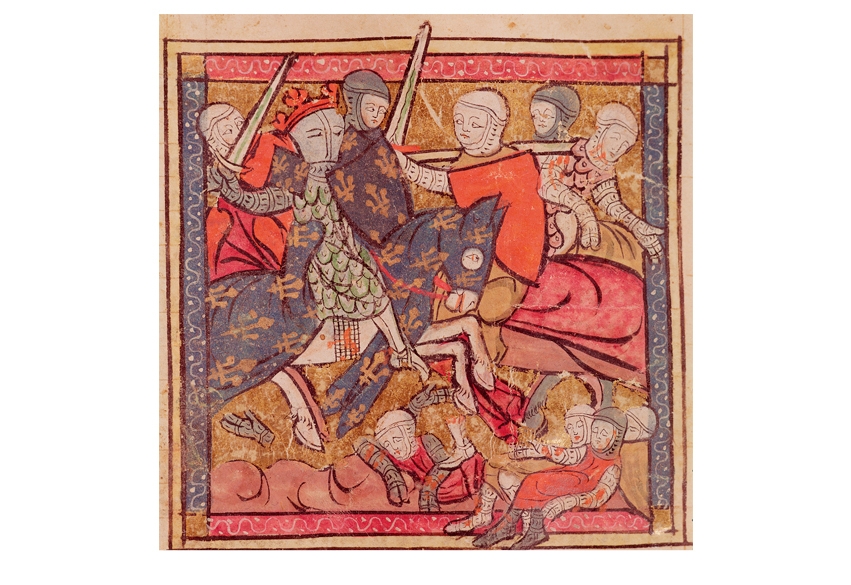One hundred and fifty years after Anglo-Saxon England was invaded by the Normans, Anglo-Norman England was invaded by the French. On 21 May 1216 King Philip Augustus’ eldest son, Louis the Lion, landed at Stonor on the Isle of Thanet, kissed a crucifix, planted it in the ground and began an 18-month war for the English crown. He had been invited to England by a group of barons who wished to replace King John as punishment for repudiating the terms of Magna Carta. The war Louis waged, although ultimately unsuccessful, was a damned near thing.
Sean McGlynn’s new book calls this England’s ‘forgotten invasion’, although in recent years Hollywood has been trying to remind people about it. The climax to Ridley Scott’s recent Robin Hood movie had Russell Crowe mugging about on Dover beach, fighting off the French hordes; Jonathan English’s rather better Ironclad was set around the violent siege of Rochester castle the autumn before Louis’s arrival.
So it is not entirely forgotten. But 1216 is certainly neglected, given the fact that John was the only post-Conquest medieval king besides Stephen to suffer the ignominy of a full foreign invasion. (Edward II, Richard II and Richard III were overthrown by invading armies, but these were all led by returning natives.)
McGlynn’s book attempts to right the historical wrong. Again, however, the title misleads. It is only on page 153 (of 241 pages of text) that Louis’s invasion actually begins. The first two-thirds of the book are a military history of John’s reign, beginning with Philip Augustus’s successful campaign to conquer Normandy between 1200 and 1204, then skipping ahead to John’s unsuccessful campaign to retake the duchy, which culminated in the monstrous battle of Bouvines in 1214.
That’s not to say this is a bad book. In fact, McGlynn tells a dashing story with gusto. His section on the siege of Château Galliard in 1203-4 is the best that has been published for a very long time. McGlynn calls it ‘arguably the most dramatic siege of the entire Middle Ages’. That’s pushing things a bit, but the author still summons up the importance and horrid excitement of the battle for Richard the Lionheart’s greatest fortress.
The question that is only partially answered, however, is why John’s reign ended in such disaster. How did he manage to rile the English barons so badly that they would rather have been ruled by a Capetian than himself?
The answer often given and repeated here is simple. John was a shit. He murdered his nephew (and rival for the English crown) Arthur of Brittany and threw his body in the Seine. He pursued personal vendettas against some of his mightiest barons, including the self-proclaimed greatest knight in Christendom, William Marshal, who had been a faithful servant to John’s father and brothers, and who held together resistance to Louis in the name of John’s son Henry III after the old king died.
John hounded the marcher lord William de Braose into exile and starved his wife and eldest son to death in jail. He exacted swingeing taxes from England and — since he was a hopeless commander known as ‘Mollegladium’ or John Softsword — wasted all the proceeds in failed campaigns across the Channel. He was reputed to be a penny-pinching, two-faced, paranoid maniac.
All true. But tight-fisted, duplicitous psychos were hardly a novelty among medieval kings. McGlynn recognises this, but still pins the bulk of the blame for John’s failures on his military ineptitude and disagreeable personality. ‘The rebellion that began in England in 1215 had been a long time in gestation, and John was its feckless father,’ he writes.
This is where I disagree. John was not the father of the rebellion, but its midwife. The first barons’ war and Louis’s invasion sprung not simply from John’s personal and military failings but from deep-seated grievances concerning the whole system of Angevin kingship, instituted in Henry II’s reign.
John’s presence at the head of this system, which deepened royal power over England, particularly through common- law processes and exchequer finance, was undoubtedly obnoxious. He hurried along rebellion and invited invasion. But the protests that spiralled into civil war and invasion in 1216 were about more than John alone.
That quibble aside, this is an entertaining military history of a very exciting reign, with cameos from great and genuinely neglected characters like the warrior-pirate Eustache the Monk and the ruthless mercenary Faulkes de Bréauté. Better still, Russell Crowe is nowhere to be seen.






Comments